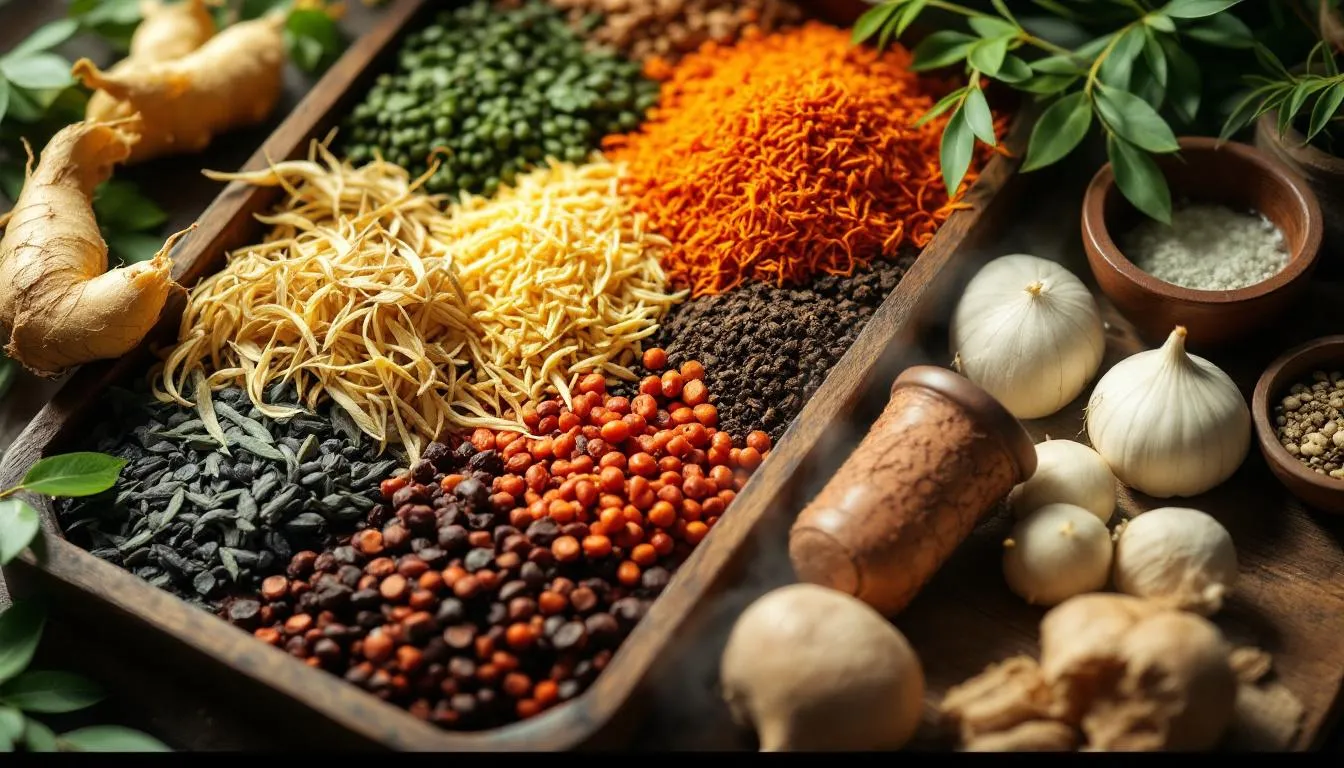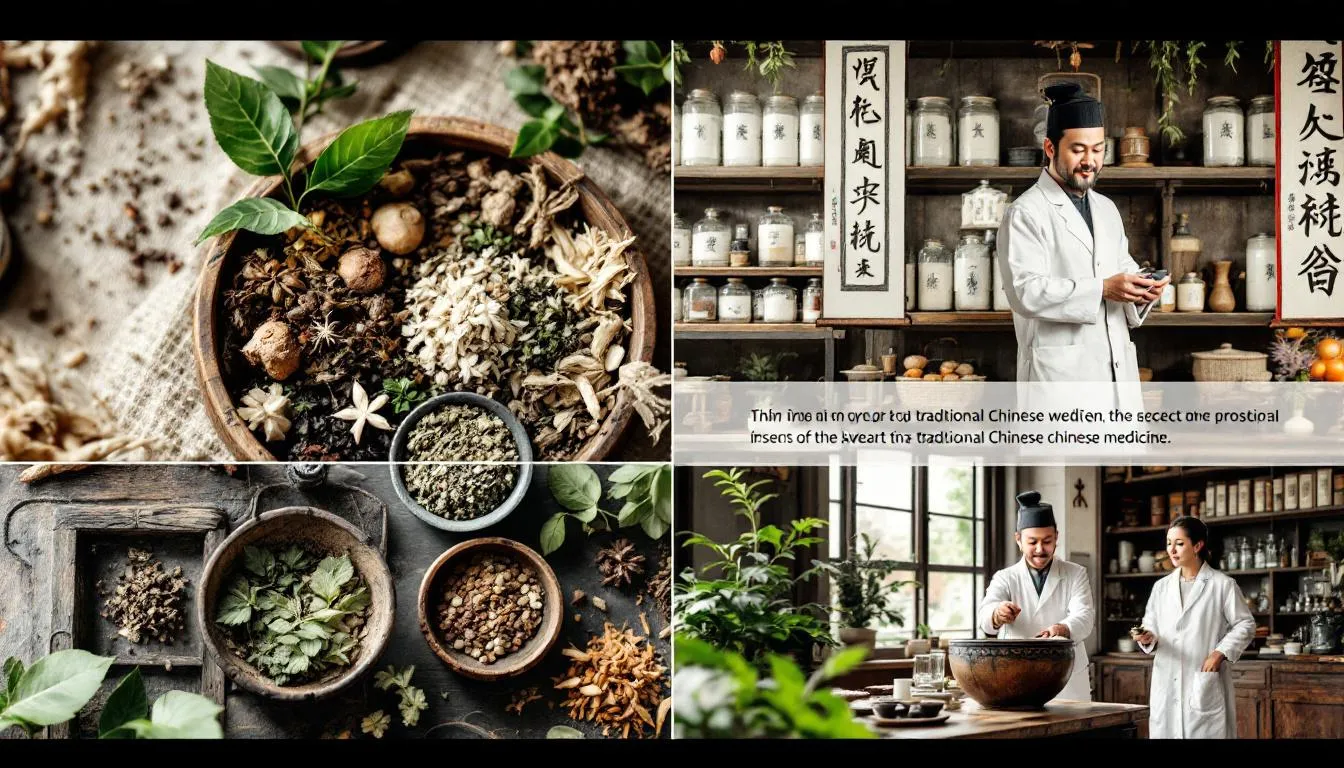Do Chinese Herbs Work: Exploring the Evidence and Benefits

Do Chinese herbs work? Many people turn to Chinese herbal medicine seeking natural treatments for various health conditions. This article examines the effectiveness of Chinese herbs based on historical use, modern practices, and scientific evidence. We’ll explore how these herbs are used, what conditions they treat, and the latest findings from clinical trials.
Key Takeaways
- Chinese herbal medicine employs a holistic approach to health, focusing on restoring balance within the body rather than merely addressing symptoms.
- Historical practices and recent clinical trials support the effectiveness of Chinese herbal remedies, though the research findings are varied and often inconsistent.
- Consultation with a qualified TCM practitioner is critical for safe use of Chinese herbs, ensuring treatments are tailored to individual health needs and minimising the risk of adverse effects.
Understanding Chinese Herbal Medicine
Chinese herbal medicine, part of the broader scope of traditional Chinese medicine (TCM), focuses on improving health by treating the entire human being, not just their symptoms. This holistic approach integrates various ancient practices to enhance overall health. Unlike conventional medicine, which often targets specific symptoms, Chinese herbal medicine aims to restore balance within the body, considering physical, emotional, and environmental factors.
Throughout history, Chinese herbal medicine has evolved, reflecting a rich historical context. From ancient texts to modern practices, it has been preserved and refined by generations of practitioners and scholars. This continuity has allowed the wisdom of the past to blend with contemporary techniques, making Chinese herbal medicine a dynamic and adaptable form of treatment.
Understanding the principles and effectiveness of Chinese herbal medicine involves exploring its historical context and the foundational principles that guide its treatments. These aspects form the bedrock upon which this ancient practice stands and offer insights into its enduring relevance in modern healthcare.
Historical Context
The roots of Chinese herbal medicine can be traced back to the Shang dynasty (1600-1046 BCE), one of the earliest periods known for recorded medicinal practices. During this time, Chinese emperors played a crucial role in preserving and multiplying the knowledge of previous ages. These efforts ensured that valuable medicinal knowledge was passed down through generations, maintaining a continuous thread of healing wisdom.
Key texts such as the ‘Huangdi Neijing’ (The Yellow Emperor’s Classic of Medicine) are foundational to Chinese herbal medicine. These ancient writings document the principles and practices that have shaped TCM over millennia. The evolution of Chinese herbal medicine is not just a testament to its historical significance but also to its adaptability and resilience through changing times.
Principles of Treatment
At the heart of Chinese herbal medicine is the concept of pattern differentiation, which focuses on identifying unique patterns of disharmony within the body to guide treatment decisions. This approach allows practitioners to tailor treatments to the individual’s specific needs, considering their physical, emotional, and environmental circumstances. The holistic approach in Chinese herbal medicine involves treating the whole person rather than just the symptoms of a disease.
Each form of Chinese herbal products has unique preparation methods that can affect their therapeutic properties, influencing how they work in treating a patient’s specific needs. This personalisation ensures that treatments are not only effective but also aligned with the patient’s overall constitution and health goals.
Focusing on restoring balance and harmony within the body, Chinese herbal medicine offers a comprehensive approach to health and complementary medicine.
How Chinese Herbs Are Used

Chinese herbal medicine encompasses a broad range of techniques aimed at restoring balance within the body. In modern practice, these herbs are often formulated into mixtures tailored for treating specific health issues. This customisation allows practitioners to address multiple symptoms simultaneously, enhancing the overall effectiveness of the treatment with traditional Chinese medicines.
Chinese herbs can be consumed in various forms, including:
- powders
- capsules
- teas
- tinctures
The versatility of these herbal products caters to different preferences and needs, making them accessible and convenient for a wide range of patients. Knowing how these herbs are used and their various forms is crucial for anyone considering adding them to their health regimen.
Customisation of Formulas
Protocols in Chinese herbal medicine often involve combining herbs tailored to an individual’s unique condition. These formulas are designed to address multiple symptoms simultaneously, offering a comprehensive treatment approach.
Practitioners often modify these formulas based on the patient’s symptoms and overall constitution, ensuring effective and relevant treatment.
Common Herbs and Their Uses
The herbs and their recognised benefits are:
- Ren Shen (Red Ginseng): commonly recognised for its adaptogenic properties, helping the body manage stress.
- Dang Shen (Codonopsis Root): frequently used to enhance energy levels and support digestive health.
- Huang Qi (Astragalus Root): valued for boosting the immune system and used in various preventive health strategies.
Chinese herbs are often utilised for alleviating digestive disorders and respiratory issues. These herbal products may provide benefits for a variety of health issues, including cardiovascular and respiratory diseases.
Knowing the common herbs and their uses helps appreciate the versatility and effectiveness of Chinese herbal medicine.
Forms of Herbal Products
Chinese herbs can be found in various forms, including:
- Extracts
- Teas
- Powders
- Capsules
The versatility of these herbal products caters to different preferences and ease of use, making Chinese herbal medicine accessible to a wider audience.
Whether you prefer tea or capsules, there is a form that fits your lifestyle and needs.
Scientific Evidence and Clinical Trials
The science community has shown increasing interest in exploring the effectiveness of Chinese herbal medicine through clinical trials. Improvements in the quality of these studies, thanks to evidence-based medicine and clinical epidemiology, have provided more reliable insights into the potential benefits of these herbal remedies.
However, the research on Chinese herbal products has shown mixed outcomes across various conditions, indicating that evidence supporting their effectiveness is not consistent. Challenges such as low-quality studies and methodological inconsistencies complicate the ability to draw definitive conclusions.
Despite these challenges, notable studies have highlighted the potential benefits of certain herbs, providing a foundation for further investigation.
Review of Clinical Trials
Recent trials have explored the effectiveness of Chinese herbal remedies and traditional remedies to treat diseases like stroke, heart disease, and respiratory issues. Clinical studies have also evaluated these remedies for conditions such as insomnia, gastrointestinal disorders, and chronic fatigue.
Additionally, certain Chinese herbs have shown potential in managing symptoms of anxiety and depression.
Challenges in Research
Research on Chinese herbal medicines often struggles with inconsistent quality and methodological rigour, hindering the reliability of findings. The variability in herbal formulations and dosages poses significant challenges in establishing consistent results across clinical trials. There have been instances of manufacturing errors where the wrong herbs were used, leading to severe health complications.
Notable Studies
A study focusing on the herb Astragalus showed it may enhance immune function in patients undergoing chemotherapy for cancer. Another clinical investigation revealed that Ginseng has potential benefits for reducing fatigue and improving the quality of life.
Research on Ginger demonstrated its effectiveness in decreasing nausea and vomiting related to chemotherapy. Turmeric has also shown promise in managing arthritis symptoms due to its anti-inflammatory properties.
Benefits of Chinese Herbs

Chinese herbal medicine offers a holistic approach to health, focusing on balancing the body’s energy and promoting wellness through natural means. By considering emotional and environmental factors, Chinese herbs can be integrated into modern healthcare practices for both preventive and therapeutic purposes.
This integration allows for a more comprehensive approach to health and well-being.
General Health Improvement
Using Chinese herbs can enhance the body’s natural healing processes, supporting overall wellness by promoting balance and supporting bodily functions. These herbs may also enhance the body’s immune function and overall vitality, contributing to better health and well-being.
Specific Conditions
Ginger and liquorice are commonly used to alleviate digestive disturbances. Studies suggest that Chinese herbs can effectively alleviate symptoms of respiratory diseases like bronchitis. Recent systematic reviews indicate that Chinese herbal medicine may alleviate symptoms associated with post-COVID-19 syndrome.
Additionally, specific herbal combinations may enhance recovery rates in patients with chronic illness.
Mental Health
Traditional Chinese medicine views disturbances in mental health, such as anxiety and depression, as imbalances in the spirit or ‘shen’. Herbs such as ginkgo biloba and Banxia houpu decoction are commonly used in Chinese medicine to alleviate anxiety.
Treatment in Chinese medicine is personalised, focusing on the individual’s specific emotional and spiritual needs rather than one-size-fits-all solutions in China.
Safety and Side Effects

Safety is a paramount concern when it comes to Chinese herbal medicine. It is essential to get evaluated by a qualified practitioner before taking Chinese herbs to ensure their safe use. Environmental conditions such as temperature and humidity can alter the allergenic potential of herbal medicines, making professional guidance crucial.
General Safety
Contamination and misidentification of herbal ingredients can pose significant risks to safety. The presence of impurities or chemicals formed during the production of herbal remedies may lead to adverse reactions. Monitoring liver and kidney function, which are vital organs, is important when taking Chinese herbs to ensure their safe use.
Regular reevaluation by a practitioner during treatment helps to maintain safety and effectiveness.
Allergic Reactions
Allergic responses to Chinese herbal products can arise from both their active and inactive components. Proper assessment by a trained TCM practitioner can help identify allergies and minimise the risk of adverse reactions to herbal treatments.
Thorough evaluation by a qualified practitioner is essential to mitigate the risks of allergic reactions.
Toxicity Concerns
Toxicity concerns in Chinese herbal medicine often arise due to contamination, misidentification, and the inherent toxicity of certain herbs. Contamination of herbal products can occur during harvesting, processing, and storage, leading to health risks when these products are consumed.
Misidentification of herbs, where a potentially harmful plant is used instead of the beneficial one intended, is a significant risk. Awareness and careful use of these herbs are crucial to avoid adverse effects.
Finding a Qualified TCM Practitioner

Consulting with a certified physician is essential before using Chinese herbal remedies to ensure safety. A qualified TCM practitioner will conduct a thorough assessment of your health history, past and current illnesses, and current medications during the initial consultation.
This approach ensures that the treatments are tailored to your specific needs and conditions.
Certification and Licensing
Consulting a licensed TCM practitioner ensures safe and effective treatment based on established standards. To practice TCM, practitioners must fulfil strict educational and ethical standards, ensuring the safety and health of their patients. This includes at least three years of training in traditional Chinese acupuncture or herbal medicine, along with biomedical sciences relevant to TCM.
Practitioners should hold a valid license from an appropriate regulatory body to ensure their qualifications. Verifying a TCM practitioner’s credentials is crucial to ensure they have the necessary qualifications and training.
Questions to Ask
When selecting a TCM practitioner, it is crucial to:
- Find one who is board-certified in traditional Chinese herbal medicine or Oriental medicine.
- Ask about the practitioner’s educational background.
- Inquire about the length of their training to assess their qualifications.
Asking about their training history and experience with particular health conditions, for example, can help determine their suitability for your needs.
Resources
Resources such as the annual Register of Practitioner Members from the Association of Traditional Chinese Medicine provide a directory of qualified TCM practitioners. Directories like the ATCM’s Register offer access to over 700 accredited TCM practitioners.
Professional organisations often provide referral services to help locate qualified TCM practitioners. The National Certification Commission for Acupuncture and Oriental Medicine’s Practitioner Directory is another valuable resource for finding certified practitioners.
What to Expect During Treatment
Knowing what to expect during treatment with a TCM practitioner can help set realistic expectations and ensure a smooth experience. The process typically involves an initial consultation, followed by regular follow-up visits to monitor progress and make necessary adjustments.
The duration of treatment can vary based on the individual’s condition and response to therapy.
Initial Consultation
The initial consultation can take up to 30 minutes and involves assessing the person’s symptoms, tongue examination, and pulse taking. Practitioners may ask about the patient’s lifestyle, diet, and emotional well-being to form a complete picture of their health.
This assessment helps diagnose patients accurately and tailor the treatment to their specific needs.
Follow-Up Visits
Follow-up appointments are crucial to evaluate treatment progress and make necessary adjustments. These visits allow the practitioner to reassess the original symptoms and address any new pain issues that may have arisen.
Regular follow-up visits ensure that the treatment remains effective and aligned with the patient’s evolving health needs.
Duration of Treatment
The duration of herbal treatment can vary significantly based on the individual’s condition and response. Some patients may need ongoing treatment for several months to achieve desired results.
The time required for herbal treatment is often personalised, reflecting the uniqueness of each patient’s health journey.
Summary
Chinese herbal medicine offers a holistic approach to health, integrating ancient wisdom with modern practices to promote balance and well-being. From its rich historical context and foundational principles to its practical applications and scientific evidence, Chinese herbal medicine has much to offer. By understanding the benefits and safety considerations, individuals can make informed decisions about incorporating these herbal remedies into their health regimen.
In conclusion, the potential of Chinese herbal medicine to enhance overall health and address specific conditions is significant. With proper guidance from a qualified TCM practitioner, these ancient remedies can be a valuable complement to modern healthcare. Embrace the journey of holistic healing and discover the timeless wisdom of Chinese herbal medicine.
Frequently Asked Questions
How do Chinese herbs work?
Chinese herbs function by reestablishing balance in the body, taking into account physical, emotional, and environmental influences. Their combined use helps to address multiple symptoms and enhance overall well-being.
Are Chinese herbs safe to use?
Chinese herbs are generally safe when administered under the supervision of a qualified TCM practitioner. Professional guidance is crucial due to potential issues like contamination, misidentification, and allergic reactions.
Can Chinese herbs help with specific conditions?
Chinese herbs can indeed help alleviate symptoms of specific conditions such as digestive disturbances, respiratory diseases, and post-COVID-19 syndrome. Their utilisation in traditional medicine demonstrates their potential effectiveness.
How do I find a qualified TCM practitioner?
To find a qualified TCM practitioner, ensure they are licensed and certified by recognised institutions, utilising resources like the ATCM's Register and the National Certification Commission for Acupuncture and Oriental Medicine's Practitioner Directory. This approach will guide you to competent professionals in the field.
What should I expect during my first visit to a TCM practitioner?
During your first visit to a TCM practitioner, you can expect a thorough assessment of your health history, symptoms, and lifestyle, along with tongue examination and pulse taking for an accurate diagnosis. This comprehensive approach aims to personalise your treatment plan effectively.